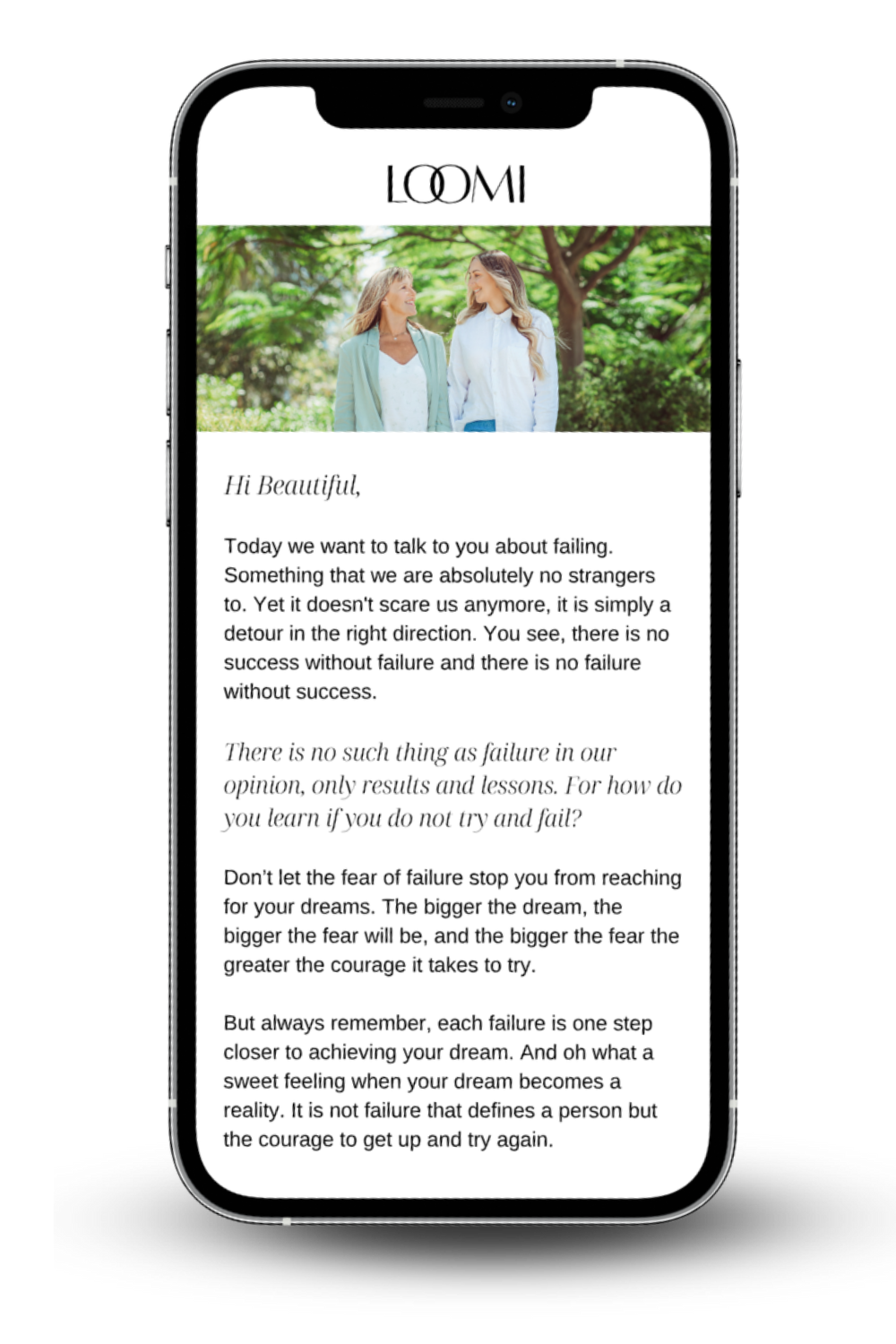The Perils of Perfection: Break Free from the Need to be Flawless
The Perils of Perfection: Break Free from the Need to be Flawless
The perils of perfection, we’ve all succumbed to them, navigating a world that seems to celebrate nothing short of flawlessness. I’m sure you’ve found yourself putting things off, fearing that you won’t meet the elusive standards and expectations. The relentless pursuit of flawlessness can turn into a crutch, a roadblock that holds us back, and ultimately, an excuse for why we haven’t chased after our dreams.
Does the following sound familiar?
“I can’t take a chance on reaching for my dreams because I’ve never done anything like it before. I won’t be any good at it. What if I’m not good enough? What if I fail? What will people say?”
A lot of what ifs huh?
But what if we flipped the script? What if we took the chance despite the uncertainty? The reality is, the only way to become good at something is to try, fail, and try again – often many times over. And who defines what’s “good enough” anyway? What is failure, and why does it matter what people say?
These are the struggles we all share, those moments in life when taking that first step feels daunting because of the fear of failure. Whether it’s trying a new sport or hobby, starting a new business, or changing your career path, the fear of failure, of not being perfect is real.
So let’s take a look at why we want to be perfect and what we can do to break free of the perils of perfection.
Why Do We Succumb the the Perils of Perfection?
Waiting for Perfection: A Sure Fire Way to go Nowhere!
Have you ever found yourself waiting for the perfect moment, idea, or circumstance before taking action? It’s a common pitfall. I understand the hesitation; we’ve all been there! But here’s the truth – perfection is elusive, and the wait might lead to missed opportunities, lost time, and, eventually, unfulfilled dreams. Embracing imperfection allows us to grow and learn through the journey, flaws and all.
Social Pressure to be Perfect
n the realm of social media and societal expectations, it’s common to feel the weight of a relentless pursuit of perfection. It’s completely understandable that the pressure to showcase flawless outcomes can trigger anxiety and a genuine fear of judgment. The curse of comparison often prompts us to gauge our worth and success against the seemingly flawless lives of others, stirring up feelings of inadequacy, self-doubt, and envy.
But, here’s something to consider: Have you ever thought about the effort behind the perceived perfection of those you compare yourself to? How many takes, edits, and moments of vulnerability were hidden behind that seemingly flawless facade? It’s a reminder that what we see on the surface often doesn’t capture the authentic journey and struggles that each person goes through. Embracing this perspective can be a way to navigate the challenges of comparison and allow yourself the understanding that everyone is on their own imperfect journey.
Perfection as a Mask of Self-Doubt
Have you ever found yourself putting on a facade of perfection because of self-doubt? It’s like we use the pursuit of perfection as a shield to hide our insecurities. But, let’s have an open conversation about this because acknowledging and addressing our doubts is the first step toward embracing authenticity and nurturing genuine self-confidence. It’s Ok not to have it all together, to be vulnerable and human.
I’ve realised that overcoming the constant need to be perfect is liberating. It’s about changing how we see things, being OK with our imperfections, and embracing who we are. When we accept that we are enough, the pressure to be perfect fades and we take chances we never before dreamed of.

How Can We Break Free from the Perils of Perfection?
Step 1
Shift Your Perspective on Failiure
Being less than perfect is not a sign of failure, it’s a natural part of the learning process. Think of it like learning to ride a bike – you might be wobbly at the start, but those wobbles are steps toward mastering the skill.
When you understand that setbacks provide valuable lessons and opportunities for growth, you move from fearing failure, to willingly taking the path toward improvement. The only true failure is when you deny yourself the opportunity to try.
Create a journal specifically for daily reflections on setbacks and growth.
1. Each day for a week write down an instance from your day that didn’t go as planned or where you faced a challenge.
2. Consider how you reacted in the moment. Were your responses constructive, or did you find yourself being overly self-critical?
3. Think about other ways you could have reacted. Could there have been a more positive or productive response?
4. Think about whether you approached the setback as a learning experience or if you criticised yourself. Understanding your mindset is crucial for future growth.
5. Reflect on the setback and ask yourself, “What can I do tomorrow to use my next setback as an opportunity to grow?”
This daily journaling practice encourages self-awareness, fostering a more positive mindset towards setbacks.
Step 2
Seek Feedback and Learn from Your Mistakes
A lot of us shy away from feedback, fearing we might look foolish or inexperienced. But what if, instead of dodging feedback, you take the courageous step to actively ask for advice? Use the feedback from a trusted mentor or teacher as a tool for growth and improvement. Remember, even the most skilled and experienced people were once beginners. They faced obstacles, made mistakes, and sought guidance to reach where they are now.
Learning from your mistakes is not a sign of weakness but a demonstration of your resilience and courage.
Ask for Help
- Select a recent task or project where you feel there is room for improvement.
- Reach out to a trusted mentor, friend or expert who can provide constructive criticism.
- Be specific on what you want to improve. Clarity helps in targeted improvement
- Actively listen without defensive, self-recriminating thoughts. Be open and vulnerable.
- Show your gratitude that they took the time to help you.
- Use the feedback to implement a plan for improvement.
Step 3
Practice Self-Compassion
Be kind to yourself. Acknowledge the hard work you’re putting in and recognise the progress you’ve made. Cultivating self-compassion means giving yourself credit for the efforts you’ve invested and understanding that growth is a process, not a race. So, take a moment to appreciate how far you’ve come, and remember that every step forward is a testament to your resilience and determination.
1. Find a quiet moment in your day where you can have a few minutes to yourself without distraction
2.Take a moment to think about what you’ve put into your day. Give yourself credit for the hard work, the progress you’ve made, and the toughness you’ve shown. If you catch yourself thinking negatively, try to flip the script. Swap out those self-critical thoughts with some positive and realistic affirmations. Instead of getting stuck on what you think went wrong, focus on what you learned and what you achieved. Keep it positive!
3. Take a moment to be thankful for the ride you’re on and all the chances it’s giving you to grow. Reflect on what you’ve learned and how you’re leveling up in your mindset and personal development every single day.
4.Visualise yourself achieving those goals and imagine all the amazing results coming from your hard work. It’s like creating a mental movie of success! Doing this helps build up that positive, can-do mindset.
By intentionally nurturing your self-compassion you are instilling a more positive and compassionate relationship with yourself.
The Perils of Perfection
It’s clear that the perils of perfection come right from self-doubt, the fear of failure, and what society expects from us. Breaking free from these perils demands more than just a change in perspective; it calls for a personal journey toward embracing imperfection. Reflecting on why we chase flawlessness, whether waiting for the perfect moment or succumbing to societal pressures, uncovers the roadblocks preventing a truly fulfilling life.
Breaking free from the shackles isn’t about changing how we see failure, but about accepting imperfections as a natural part of the learning process. Embracing self-awareness and treating mistakes as valuable lessons become second nature, paving the way for personal growth and resilience.
The moment you stop waiting for everything to be perfect before chasing your dreams is a mix of excitement and relief, all rolled into one.
It’s the beginning of an unlimited life!
LOOMI letter
Get the good stuff delivered directly to your inbox

LOOMI letter